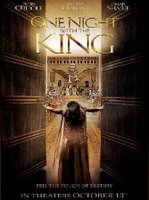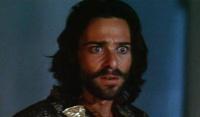 One Night with the King has been out for a week now, so, having already reviewed the film, I thought it was about time I did a comparison between it and the biblical text. First however, there are tons of reviews for the film, so I’d just like to highlight a few of the ones I’ve appreciated. Steven D Greydanus (Decent Films), G.M.Gretna (LMLK Blog), and Russ Breimeier, (Christianity Today). CT’s Film Forum also summarises 9 other reviews (including mine). If you’re wanting a full range of reviews, then I suggest you check out Rotten Tomatoes where, sadly, the film currently has only scored 19% on the tomatometer.
One Night with the King has been out for a week now, so, having already reviewed the film, I thought it was about time I did a comparison between it and the biblical text. First however, there are tons of reviews for the film, so I’d just like to highlight a few of the ones I’ve appreciated. Steven D Greydanus (Decent Films), G.M.Gretna (LMLK Blog), and Russ Breimeier, (Christianity Today). CT’s Film Forum also summarises 9 other reviews (including mine). If you’re wanting a full range of reviews, then I suggest you check out Rotten Tomatoes where, sadly, the film currently has only scored 19% on the tomatometer.Since I’m doing this scene analysis so soon after the release date, I should stress that it will contain SPOILERS throughout, and is really aimed at those who have already seen the movie. If you haven’t I suggest you stick with my review for now. The episodes work out as follows:
Saul's disobedience - (1 Sam 15)Notes
[Extra-Biblical Episode(s)]
Haman's ancestry - (Esther 3:1)
[Extra-Biblical Episode(s)]
Vashti refuses to attend - (Esther 1:1-22)
Hadassah to Esther - (Esther 2:10)
Esther Seized - (Esther 2:1-8)
[Extra-Biblical Episode(s)]
Esther gains Hegai's favour - (Esther 2:9)
Esther's preparation - (Esther 2:12-14)
[Extra-Biblical Episode(s)]
Esther takes Hegai's suggestion - (Esther 2:15)
[Extra-Biblical Episode(s)]
Story of Jacob and Rachel - (Gen 29:9-20, )
[Extra-Biblical Episode(s)]
Esther chosen - (Esther 2:16-18)
Mordecai uncovers a plot to kill the king - (Esther 2:19-23)
[Extra-Biblical Episode(s)]
Haman plan to kill the Jews - (Esther 3:7-15)
[Extra-Biblical Episode(s)]
Esther and Mordecai hear of Haman's plot - (Esther 4:1-10)
Reading of - (Is 40)
Mordecai refuses to bow - (Esther 3:1-6/5:9)
Mordecai honoured - (Esther 6:1-14)
Mordecai persuades Esther - (Esther 4:11-17)
Esther's request - (Esther 5:1-8)
Haman's plot revealed - (Esther 7:1-10)
Xerses' edict for the Jews - (Esther 8:1-17)
Mordecai initiates Purim - (Esther 9:18-32)
 The film contains almost all of the episodes recorded in the biblical book of Esther although it compresses some, and greatly expands others. Consider for example the events of Chapter 2. These form only a tenth of the book, but almost half of the film. This means that there us a clear emphasis on the romance aspect of the story. Yet, the romantic aspect of the story may be entirely fictional. We are told Esther is attractive (Est. 2:7), and more attractive to Xerses than the others (2:17) but this alone is not sufficient evidence to support a 21st century notion of romantic love.
The film contains almost all of the episodes recorded in the biblical book of Esther although it compresses some, and greatly expands others. Consider for example the events of Chapter 2. These form only a tenth of the book, but almost half of the film. This means that there us a clear emphasis on the romance aspect of the story. Yet, the romantic aspect of the story may be entirely fictional. We are told Esther is attractive (Est. 2:7), and more attractive to Xerses than the others (2:17) but this alone is not sufficient evidence to support a 21st century notion of romantic love.The episodes the film leaves out are significant. The most notable omission is the first half of chapter 9 where Esther asks Xerses for a second day for the Jews to defeat their enemies, leading to 75,000 deaths. The film implies that (nearly) all of the enemies of the Jews are dissuaded from attacking them, whereas this was not the case. Esther’s second banquet is also excluded presumably to simplify the story and make it flow better as a film.
 The order of the events is also changed. In the biblical text Haman initially just wants to kill Mordecai, because of his refusal to bow before him. It is only once he realises that Mordecai is a Jew that he decides to kill them all. Whilst this suggests anti-Semtism in Haman prior to this incident, it also suggests that he was not primarily motivated by his purported Amalekite ancestry.
The order of the events is also changed. In the biblical text Haman initially just wants to kill Mordecai, because of his refusal to bow before him. It is only once he realises that Mordecai is a Jew that he decides to kill them all. Whilst this suggests anti-Semtism in Haman prior to this incident, it also suggests that he was not primarily motivated by his purported Amalekite ancestry. There is also a large amount of material added to this story, and particularly the first two-thirds intersperse one biblical episode with one or more extra-biblical incidents. This allows for a heavy degree of interpretation, but it also applies historical background, rounds out the various sub-plots and fleshes out some of the minor characters. It also cleverly weaves the minor figures from the book into larger roles, so Admatha, Memucan (both ch.1) and Hathach (Ch.4) have their roles expanded, and Esther’s reliance on Hathach is put down to their friendship before they were seized. It’s all speculation of course, but is artistically valid even if it is not historically sound.
 Finally, the film contains a number of other biblical references. The most obvious is the inclusion of the story of Saul sparing Agag (1 Sam 15), which features the much-vaunted cameo by Peter O-Toole. The inclusion of the story of Jacob and Rachel (Gen 29) is also fairly memorable. More obscure and, thus, less noticeable passages are also included. When first confronted with the news about Haman’s plot, Mordecai recites Isaiah 40, which, curiously, is chosen instead of the Deuterocannonical prayer of Mordecai. Another citation from elsewhere in the bible is the oft-repeated line from Proverbs 25:2: "It is the glory of God to conceal a thing; but the honour of kings is to search out a matter". There is also a reference to Shadrach, Meshach and Abednego, (Dan 3), as well as references to the events leading up to the exile and the fact that some Jews have returned.
Finally, the film contains a number of other biblical references. The most obvious is the inclusion of the story of Saul sparing Agag (1 Sam 15), which features the much-vaunted cameo by Peter O-Toole. The inclusion of the story of Jacob and Rachel (Gen 29) is also fairly memorable. More obscure and, thus, less noticeable passages are also included. When first confronted with the news about Haman’s plot, Mordecai recites Isaiah 40, which, curiously, is chosen instead of the Deuterocannonical prayer of Mordecai. Another citation from elsewhere in the bible is the oft-repeated line from Proverbs 25:2: "It is the glory of God to conceal a thing; but the honour of kings is to search out a matter". There is also a reference to Shadrach, Meshach and Abednego, (Dan 3), as well as references to the events leading up to the exile and the fact that some Jews have returned.
the filmm was so beautiful i wish i could watch it all the time, although some of it is fictional it does show come biblical charactirsitics. i love it
ReplyDeleteOne Night With The King several people and reviews praise this film for staying close the Bible, which it does not. They praise the false. It is about 20% Bible, and 80% Hollywood. While the movie Esther (1999) Louise Lombard is about 70% Bible and 30% Hollywood.
ReplyDeleteI certainly prefer the Lombard version, though as you say, it takes some liberties as well (which personally I don't mind so much).
ReplyDeleteThanks for dropping by,
Matt